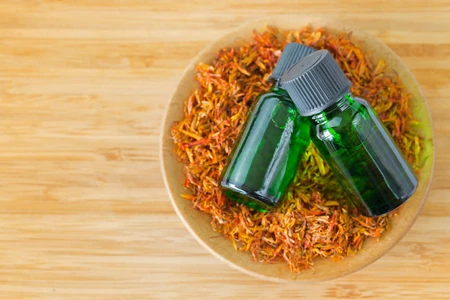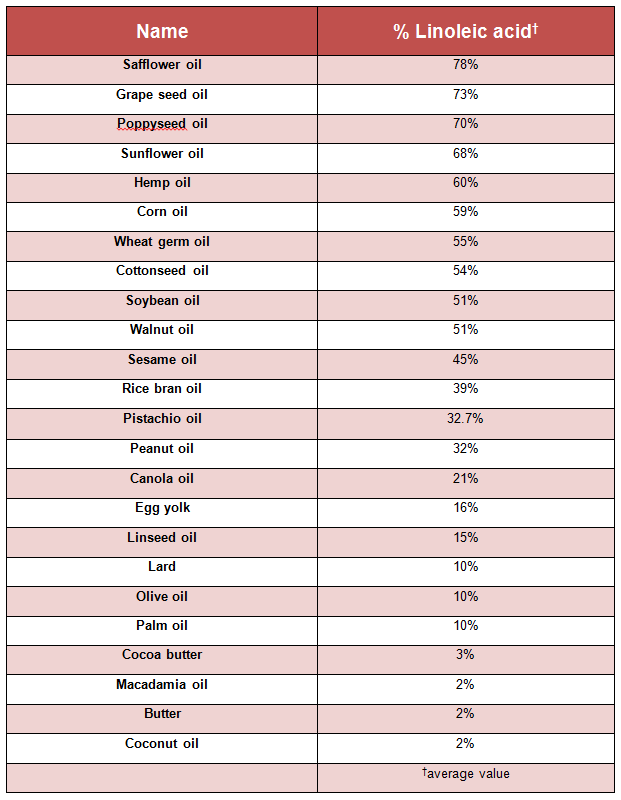Safflower Oil Benefits for Skin - Nature's Best Skin Secret

Did you know that safflowers were found in King Tut’s tomb?
Yes, safflowers, and safflower oil, has a long history spanning from ancient times to the modern day. So, it must have something going for it!
Beyond using safflower oil for skin, which we will discuss below, I am sure many of you have heard of or know of safflower oil because you have been cooking with safflower oil on high heat for years! But there is more. Did you know safflowers have been used as an oil that is blended into paint, and as a dye, by soaking of its leaves? Safflower oil really is one of the King’s of Oil!
I know, right now, you might be thinking "is safflower oil healthy?" and or "why would I put anything that makes paint on my skin?".
Well, how about them safflower oil benefits for skin include greater elasticity, fewer lines and wrinkles plus glowing skin? But before we go deep and discuss how safflower oil benefits skin, lets review exactly what safflowers are.
What is Safflower Oil and Where Does it Come From

Safflower oil comes from Safflowers, which are annuals, meaning they live for one season only. They are related to sunflowers. About half of all US production is from California with the rest from half a dozen other states. When harvested, the seeds are removed and set aside. Some of the seeds are untreated and used for soap or even floor tiles – that is because the untreated oil is too bitter to consumer.
Treated seeds are used for food-grade oils. Some are used for cooking oil, especially in deep frying applications. Other safflower oil seeds are treated to be used in salad dressings and cold in other uses.
Again, you might be shaking your head saying outloud, “EUWWWWW! Why in the world would I want to put that stuff on my face?”.
I understand. I used to think the same thoughts myself about natures best kept skin secret!
What is special about Safflower Oil?
 First, safflower oil on the skin is amazing as safflower oil has a ton of Vitamin E and many experts consider safflower oil high Oleic. Which is it.
First, safflower oil on the skin is amazing as safflower oil has a ton of Vitamin E and many experts consider safflower oil high Oleic. Which is it.
Which means, safflower oil is healthy, as it is rich in Omega fatty acids and very high in monounsaturated fats. So if you are consuming the oil, this will help to get rid of bad cholesterol and support a healthy heart and body.
And as mentioned, cooking with safflower oil in high heat is ok. In fact, it is exceptional as its burning temperature is about 50 degrees higher than canola oil, which many people sometime use because it is a cheaper heart friendly substitute.
I like to think anything that can burn at such high temperatures must know something I don't!
So How Come Safflower Oil is Good for the Skin?
The benefits of safflower oil in skin are plenty and support your skin in many ways. The secret is: Linoleic acid. Linoleic Acid is the big reason why safflower oil is healthy and good for you.
Omega-6 fatty acid is considered Linoleic and is (along with Omega-3) considered essential to our diet. And safflower oil is a leading provider of both of these elements.
And it's not just me saying this.
A clinical study was conducted at the Linus Pauling Institute, at Oregon State University, to determine the facts. YOu can read all about the Omega 3's 6"s and Linoleic acids and their relationship to skin health here.
Did you know safflower oil has the highest concentration of linoleic acids of a long list of commonly used oils, as indicated below.

How Does Safflower Oil Actually Benefit the Skin?

The linoleic acid and vitamins found in safflower oil has special properties. Because it is necessary for health functioning of our cells, it naturally effects and positively impacts the appearance and texture of the largest organ, our skin. And effects the look and quality of our hair too.
One application is acne-prone skin. This kind of skin suffers from a relatively low amount of Linoleic acid and can be helped by treatments with oils high in Omega-6. Actually, rubbing Linoleic acid (in low concentrations) on acne-prone areas has been proven to reduce pimples, for example[1].
Studies also show the wonderful effect of safflower oil’s Linoleic acid on discolored skin[2]. A mild treatment produced a reversal of sun related skin damage in lab tests.
Linoleic acid also encourages the growth of new skin cells, refreshing the surface of the skin and helping to obtain that younger looking, super fresh appearance.
Another reason safflower oil for is great for your skin is elasticity. Yes, the naturally occurring linoleic acids and hydrating properties found in safflower oil support skin resiliency as well as help to minimize the appearance of fine lines and wrinkles!
Which is also the reason why I use safflower seed oil in my skin care line.
So, What’s the Bottom Line?
The next time you ask yourself "is safflower oil good for skin" or "is safflower oil healthy", remember this article, think Linoleic Acid and Linus Pauling Institute, and say "YES! Safflower oil is good for me And my skin."
We have choices every day as to what we consume – if we value our skin health and beauty (and who doesn’t?!), we should consider safflower oil as a ‘Superskin’ choice and natures best kept skin secret.
Until Next Time,
Kellie
Growing Younger Everyday
Reference:
[1] https://onlinelibrary.wiley.com/doi/abs/10.1046/j.1365-2230.1998.00315.x
[2] https://link.springer.com/article/10.1007/s004030050320
[ɫ] https://www.news-medical.net/health/Oils-Rich-in-Linoleic-Acid.aspx
https://lpi.oregonstate.edu/mic/health-disease/skin-health/essential-fatty-acids
3 Day Jumpstart to Get Glowing Skin, More Confidence, + Look and Feel Fabulous!
You can unsubscribe anytime. Please check our privacy policy.

